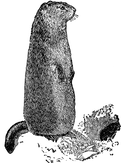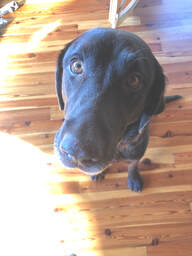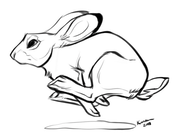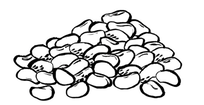 Every idiom has a story. Here are a few I find entertaining. In the 1800s, English speakers in America borrowed a Cree word for marmota monax (also known as the groundhog). They squeezed it into sounds that made some sort of sense in English, & ended up with woodchuck. These rodents were powerfully effective diggers, and regularly dug up the dirt roads, yielding chuckholes. Today, though rodents aren’t responsible, we still call the cavities in asphalt & cement roads, chuckholes. Some early puritans held the belief that a human was made of two halves: the body, & the spirit. Given puritanical thinking regarding the body, it should be no surprise that the spirit was considered the better half. When Sir Phillip Sydney wrote The Countess of Pembroke’s Arcadia, he applied this concept to marriage. Ever since, any married individual has a better half. The word bootlicker was born in the US of A’s youth. When hunters returned from a successful hunt (which often involved dressing and skinning), they weren’t very good at cleaning up their footwear, and stray dogs would follow them to lick their boots. The story goes that the trained hunting dogs would never stoop so low (hmmm), so bootlicker refers to the fawning behavior of curs. The most plausible of the many possible origins for getting one’s ducks in a row has to do with bowling. When bowling first made its way to America, a narrower-then-usual pin was used, which resembled a duck looking upward, & was called a duckpin. In those early years, machinery didn’t set up the pins for the next bowler, so someone had to run down the lane to put the ducks in rows. Voila. In China, a task that requires synchronized multiple hands can be accompanied by the phrase (said in unison), gung ho, which translates to work together. And it’s no surprise that when a bunch of people work together, amazing things can be accomplished. English-speaking observers impressed by such feats as the Great Wall, figured it took a bunch of enthusiasm to manage such a project. Ever since, gung ho! has meant very enthusiastic (in English, anyway). There are a couple possible origins for put up your dukes, & duke it out. Some etymologists link this to the British cockney tradition of labeling one thing by the name of something else that rhymes. Apparently, before 1700, fingers were referred to as forks. Cockney speakers combined this information with the royal title the Duke of York. Since fingers were already called forks, obviously, hands must be dukes! Makes perfect sense, right? Story #2 involves a specific Duke of York — Frederick Augustus, who was “widely admired” as a bare-knuckle fighter. So, fo course, why not call fists dukes? I’d love to know which of these origin stories you find most intriguing, unlikely, or most satisfying. My thanks go out to this week’s sources, Webb Garrison’s Why You Say It, Etymonline.com, , Phrases.org, Collins Dictionary, & the OED.
4 Comments
 Dogs make it into English idioms all the time, as dogs make their way into our hearts. As you consider this photo of The Noodle, looking contrite, consider the following: dog & pony show shaggy dog story as sick as a dog like a dog with a bone call off the dogs dirty dog dog eats dog dog-tired dog-eared every dog has its day raining cats & dogs go to see a man about a dog hot diggety-dog! a dog’s life let sleeping dogs lie meaner than a junkyard dog put on the dog tail wagging the dog hair of the dog that bit you life in the old dog yet you can’t teach an old dog new tricks in the dog house I had a bit of a milquetoast upbringing & had always heard one of the above terms, yet really hadn’t constructed much meaning for it. Then, in my twenties I had a character of a roommate named Mick. He kept me laughing with his Irish accent, colorful terms & his drinking ways. Nearly every Saturday morning I’d get up to see Mick sitting on our lumpy, brown floral sofa, his eyes at halfmast & a beer in his hand. “Hair o’ the dog what bit ya,” he’d say, wincing between swigs. Followers, please add something in the comments section: 1. What dog idioms did I leave out? 2. Tell your tale about one of the idioms above. My thanks go out to this week’s sources The OED, Etymonline, The Free Dictionary, & Cesar’s Way  There are heaps of ways we refer to something being speedy or needing to be speedier. Here are a few: -quick as a bunny -in three shakes of a lamb's tail (only two shakes in the UK) -quick as a wink -in the blink of an eye -in a flash -quick as lightning -get the lead out Here are some for which I could find source information: -fast track (1934 from horse racing) -pronto (1850) from Spanish &/or Italian from a word meaning prompt -breakneck (1560s) moving so fast one is likely to break one’ s neck -giddy up (1909) a mispronunciation of get up, also spelled gee-hup, gee-up & giddap. -flat-out — most likely from horse-racing when horse & jockey flatten out to decrease wind resistance -posthaste (1530s) with great speed - a request written on the envelopes of letters -lickety-split (1852) most likely based on lick - a speedy sprint while racing - also lickety-cut, lickety-click, & licketie — probably related to quick as a lick -faster than you can say "Jack Robinson" has numerous proposed sources, none of them confirmed, but all intriguing: -Jack Robinson was US Secretary of the Treasury in the late 1700s & was able to get things done speedily in Congress -another Jack Robinson was constable of the Tower of London, responsible for quickly successive beheadings -another Jack Robinson was an English gentleman well-known for speedy changes of opinion Have you got a favorite idiom regarding speediness, or did any of these sources surprise you? If so, please let me know in the comments section. Thanks to this week’s sources, Etymonline.com, the OED, Merriam-Webster, Answers.com, ,& Wordnik.com. Image from Grumpy Goat Tattoo..  Here’s a brief collection of English idioms based on foods. You don’t know beans! This idiom seems to have shown up in the 1850s. Linguists pose two differing arguments for its source. One school suggests that because beans are both small & a basic food source, to not know beans is to not understand the simple basics of life. The second school cites a rural American riddle: How many blue beans does it take to make seven white beans? The answer is, (for those of you who don’t know beans) seven. To make blue beans white you simply peel off the skin. Apparently this was seen as common knowledge. Anyone who couldn’t answer the riddle didn’t know beans. Hard-boiled This is a tricky one because though it appears to a food-based-idiom, it isn’t. It comes from the steamy kitchens of the American frontier. Those who did the laundry typically used lye soap (which wasn’t as effective as it might have been). When the clothes got too dingy, launderers of the day boiled them for an extended time with starch. Pieces of clothing that had received this treatment tended to be uncomfortably stiff, & were referred to as hard-boiled. At some point the term morphed to describe a person who was likely wearing over-starched clothing & shared that clothing’s characteristics of being unyielding and emotionless. Fishing for information This idiom was introduced by none other than Geoffrey Chaucer in Canterbury Tales. Historians tell us Chaucer was quite the fisherman (in the literal sense). The intimate nature of Canterbury Tales shows us he was apparently also gifted at fishing for information. Cheesecake In 1934, Time magazine appears to have coined this idiom, & defined it to mean, “leg-pictures of sporty females.” Like many idioms, this one reflects its times. The “sporty females” photographed in Time magazine all had skin the color of cheesecake. Modern cheesecake shots do not discriminate in terms of skin color & generally involve exposure of more than the legs. Ham If it takes a little digging to see racist attitudes or flat-out racism reflected in the birth of the idiom cheesecake, seeing racism in the origins of the idiom ham takes no digging at all. The minstrel shows of the 1800s that often featured white actors in “black face” are responsible. Often, the makeup was removed by use of ham fat. It seems the use of ham fat in concert with the horrible acting based on racist stereotypes gave birth to the idiom. Nothing like a food-based idiom, eh? I’m hoping you’ll have something to say about it all in the comments section. Big thanks to this week’s sources: Etymonline, Wordnik, Merriam-Webster,Dictionary.com, & Webb Garrison’s Why You Say It (1992 - Thomas Nelson)  Generally, a Wordmonger post offers up information. This week, I’m hoping to turn the tables & collect information. Lately I’ve become interested in turns of phrase that are still very much alive, yet no longer make literal sense because technology has changed and made these terms archaic, forcing them from the sensible, literal world into the figurative universe of idioms. I can’t find reference to this phenomenon, so I’ve taken the liberty of calling such terms archidioms (archaic + idiom). It’s the rare TV or radio today that has a switch in need of turning, but we continue to turn on the TV & radio (or for that matter, turn them off). Though no turning is involved, we’ve held onto the phrase. We used to grab the seat belts from the floorboards, lift them to our laps and buckle up. These days most of us reach up to find the seat belt, then pull it down in order to buckle up. Hmmm. Though it makes no sense at all, after saying good-bye on our cell phones, we hang up the phone. And even on those phones we actually can Generally, a Wordmonger post offers up some information. This week, though, I’m hoping to turn the tables & collect information. Lately I’ve become interested in turns of phrase that are still very much alive, yet no longer make literal sense because technology has changed and made these terms archaic, forcing them from the sensible, literal world into the figurative universe of idioms. I can’t find reference to this phenomenon, so I’ve taken the liberty of calling such terms archidioms (archaic + idiom). It’s the rare TV or radio today that has a switch in need of turning, but we continue to turn on the TV & radio (or for that matter, turn them off). Though no turning is involved, we’ve held onto the phrase. We used to grab the seat belts from the floorboards, lift them to our laps and buckle up. These days most of us reach up to find the seat belt, then pull it down in order to buckle up. Hmmm. Though it makes no sense at all, after saying good-bye on our cell phones, we hang up the phone. And even on those phones we actually can hang up, how do we enter phone numbers? We dial. When a distracted friend’s phone starts quacking, or singing “The Hallelujah Chorus” or “Jeremiah was a bullfrog” we say, “Hey! Your phone's ringing.” There have to be dozens more terms that once made literal sense, but have been forced into Idiomland due to the inexorable march of technology. Good readers, please sort through your wonderful brains & leave any new archidioms in the comments section.  As noted three posts ago, recent DNA findings have placed some very unlikely animals under the ungulate (hoofed mammals) umbrella: whales, dolphins & porpoises. Most closely related to the hippopotamus, whales, dolphins & porpoises (also known as cetaceans) no longer have an order of their own. Scientists haven’t quite settled over whether cetaceans are a suborder or infra-order of ungulates. The word cetacean entered English in 1830 from Modern Latin, meaning any large sea creature. The Latin term was derived from the Greek word ketos, whale or sea monster. No one knows the source of ketos. The Old English word hwæl, which meant both whale & walrus, gave us the word whale. Our modern idiom whale of a/n _______, meaning big or excellent showed up in 1900. One of many whales is the killer whale. The word killer showed up in the 1400s from the English word kill (which first appeared in the 1200s), & meant one who strikes, beats or knocks. Though we’re not 100% sure, kill may have come from the Old English word cwellan, to kill. Cwellan is also the most likely suspect for the source of qualm & quell. Our idiom to kill time kicked in about 1728. The figurative meaning of killer, impressive person or thing appeared in 1900, and the term killer instinct showed up in the world of boxing in 1931. And getting back to cetaceans, the killer whale was first called that in 1725. In the early 1300s the word porpas appeared in English, from the Old French word porpais, which translates ingloriously to pork fish. Interestingly, the German word for porpoise translates literally to sea hog. It’s likely the somewhat pig-like snout of the porpoise may be responsible for both words, though a modern etymologist might wonder whether those long-ago French & German porpoise-namers may have sensed a deeper connection to the porpoise’s distant ungulate cousin, the pig. Our word dolphin came from French in the mid-1300s. We can trace dolphin back through Old French, Medieval Latin, Latin & Greek to the word delphinos, meaning dolphin. This Greek root is closely related to delphys, meaning womb. Etymologists suggest Ancient Greeks found it remarkable that instead of coming from eggs, the progeny of this “fish” arrive through live birth. Dear readers. If you’ve got anything to say about these water-bound “hoofed mammals,” please do so in the comments section. Big thanks to this week’s sources: Wordnik, Science Direct, Ultimate Ungulate,Etymonline, & the OED.  Thanks for tuning into the third of three posts on up, a brief list of a few more idioms that employ the word up. 1700s – to cheer up or become happier 1700s – bottoms up or cheers! 1809 – toss-up or an even matter 1818 – to turn up one’s nose or show disdain 1823 – to upend or turn over 1844 – to buck up or cheer up 1860 – to jack up or hoist or raise 1881 – to whoop it up or make a joyful disturbance 1896 – all choked up or overcome with emotion 1903 – to live it up or live extravagantly 1904 – to jack up or raise a price 1926 - to wrap up or put an end to 1933 – to mess up or make a mess of 1935 – to shack up or cohabit 1960 – upchuck or vomit Please use the comments section to remark on any of these terms or the dates they appeared. Big thanks to this week’s sources: Go English, Albert Jack, Etymonline, & the OED.  The versatile two-letter word up can function in English as an adverb, noun, verb, or adjective. Up plays a role in countless idioms & compound words. I hope you enjoy the few that follow. 1400 – shut up - This idiom’s original meaning was to keep from view or use. It wasn’t until 1814 that it applied to shutting one’s mouth. 1530s – grow up -- This idiom may have come from the late 1300s term grown-up, which was originally an adjective meaning mature, & added its noun meaning an adult in 1813. The directive, grow up, meaning be sensible, showed up in 1951. 1550s – start-up – This verb, meaning rise up, came from the term upstart, which appeared back in 1200. By the 1590s start-up added to its meanings, come suddenly into being. 1811 - up to snuff - This idiom appeared some 160 years after the practice of inhaling powdered tobacco into the nose became all the rage in England. Its original meaning was sharp, wide awake, not easy to deceive, & most likely reflects the somewhat caffeine-like effects of snorting powdered tobacco. 1830 – seven-up – A children’s game that added a new & carbonated meaning in 1928. 1841 – smash up – A collision. 1897 – dustup – This term means a fight. It probably grew out of the 1680s ironic idiom to dust someone’s coat, which meant to beat someone soundly. 1977 - upload – A word we hear & understand constantly these days, yet just a few decades ago it would have left us all with wrinkled brows. Please use the comments section to tell me what’s up. Big thanks to this week’s sources: Merriam Webster, Wordnik, Etymonline, & the OED.  Idioms. You gotta love ‘em. This one has a particularly interesting history. The word starkers showed up in English in 1923, meaning completely naked. Its roots appear in the term stark naked, which English speakers were using as early as 1520. At this point in the family roots, there’s an unexpected fork. One would expect stark naked & starkers’ origins to be stark, which came from the Old English word stearc, which meant obstinate, severe, rigid, stiff, stern, strong or violent. By the 1400s, the idiom stark dead came about. Though stark actually referred to the rigidity of a corpse, popular understanding led to the belief that stark was intensifying dead, much like saying truly dead or very dead. It appears this caused the meaning of stark to shift to mean utter, sheer or complete. By the 1640s, that newly established meaning contributed to the Idiom stark raving, possibly translatable today as totally psycho. By the 1830s, likely due to the idiom stark naked, stark added a new meaning, bare or barren. Some other words that were born into Old English of the stiff meaning of stearc include stork, thorn (who would’ve thunk?) & possibly stretch. A century or more later, starch, stereo, & sterile all came from the stiff or rigid meaning of stark. But wait. What about that previously mentioned “unexpected fork” in the family roots? The two words or terms above that didn’t come from stearc are stark naked & starkers. They came from another Old English word, steort, which is also the root of the name of a bird called a redstart, a colorful critter named for its red derriere. All this because steort meant rear end, rump or buttocks, which leads to the realization that stark naked actually translates to ... butt naked. Idioms. You gotta love ‘em. Big thanks to this week’s sources: Merriam Webster, Wordnik, Etymonline, & the OED.  The following idioms don’t follow a theme or tell a story. They simply have individual elements I find fascinating. I hope you’ll agree. The term blubbermouth, a crybaby or weepy person, has been around since 1400. Originally, blubber (spelled blober) referred to the bubbling, foaming sound & product of the tide. By the 1500s the term picked up the meaning whale oil, and a century later the meaning whale fat. Some weeping-related synonyms that have since fizzled out include blubberguts, blubberhead, & blubbercheeks. Our figurative term can’t hold a candle to has wonderfully literal beginnings. Back when candles were first created, if a task needed to be completed after sunset, the most able person performed the task while a less able person held the candle. The term is a double whammy insult, as it suggests someone who's deemed incompetent to do the work turns out to be unable to manage the menial task of holding the candle while the work's being done. A goody-two-shoes is an obnoxiously good individual. The term was born in the 1700s in John Newbery’s children’s collection, Mother Goose’s Melody: or Sonnets for the Cradle. One of the stories featured a painfully poor girl who was fortunate enough to be given a pair of shoes. She was so pleased, she started most interactions by pointing at them & exclaiming, “Two shoes!” It’s not entirely clear how an eternally grateful individual morphed into an obnoxiously good individual, but we’ll let that mystery be. Contrary to popular assumptions, the idiom out of sight, meaning excellent, has been in existence since 1896. The term whipper-snapper, or small, cheeky person, appeared first in the 1670s. A century before that, the term snipper-snapper held a similar meaning, which is cited by some sources as whipper-snapper’s origin, though other sources claim whip-snapper, person in charge, is the origin of whipper-snapper. The term narrow-minded, meaning small-minded & bigoted, was born in 1625. Interestingly, its sister-word narrow-hearted, meaning mean, ungenerous & ignoble, has not survived. So, did anything in that somewhat arbitrary list pique your interest? If so, please leave a comment. Big thanks to this week’s sources: Hugh Rawson’s book Wicked Words, Merriam Webster, Etymonline, & the OED. |
I write for teens & tweens, bake bread, play music, and ponder the wonder of words in a foggy little town on California's central coast.
To receive weekly reminders of new Wordmonger posts, click on "Contact" & send me your email address. Archives
November 2023
|


 RSS Feed
RSS Feed